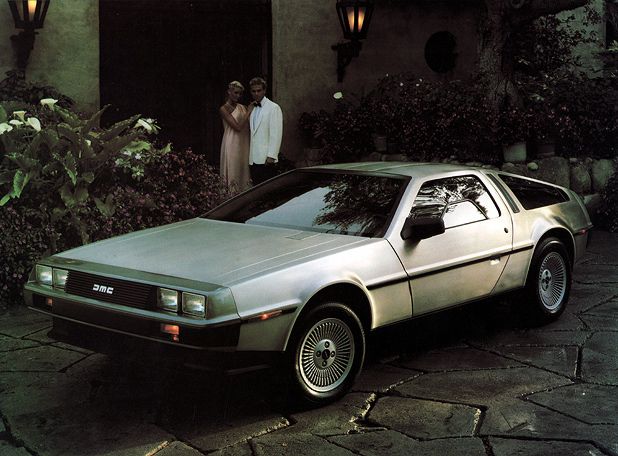Duncan Campbell: Make It New John

‘Ello John got a new motor?
Meet John DeLorean. It’s a name that swaggers with the charismatic if somewhat clichéd machismo of a pulp fiction hero, self-made, aspirational sort, all sports cars and girls, with an Icarus-like downfall plotted in. DeLorean was all too real, however, as was the science-fiction speed machine that for a brief moment in 1981 threatened to turn the motor car manufacturing industry upside down. Looking every inch the silver fox who turned the American Dream into his own private road trip, DeLorean’s image is the iconic inspiration behind Make it New John, a new film which forms the basis for Duncan Campbell’s first major solo exhibition in Scotland.
‘The starting point for me was the car,’ says Campbell. ‘I knew the car from Back To The Future and I knew a bit about the scandal, but once I started looking into it, it became clear that there was this huge gap between the perception and the reality of the car, which is already an object that men fetishise.’
Campbell has pieced together archive documentary footage of DeLorean, who, following a brilliant career with General Motors, opened up a factory in Northern Ireland to manufacture the racy-looking but technically flawed DMC12 sports car. ‘I found the paradox fascinating, especially because you can’t separate the car from DeLorean himself, and the associations he imbued the car with. DeLorean had this rags to riches life, and then went out on his own, with the then Labour government dazzled by him enough to give him all this money.’
This isn’t the first time Campbell has put missing-presumed-dead former headline-makers back into the spotlight. His 2008 film, Bernadette pieced together footage of Bernadette Devlin, the Irish Republican MP, elected in 1969, aged 21, just before the Troubles exploded. For a brief period Devlin became tabloid fodder, demonised as ‘Fidel Castro in a mini-skirt.’ Unlike DeLorean, who died in 2005, Devlin is still alive.
‘She had this really incendiary period,’ Campbell observes, ‘where there was this parallel Bernadette Devlin created by the media. She spent a lot of time trying to counteract that, but after that period, when the Troubles became violent, it was almost as if she’d died. It’s difficult for an icon to retain a heroic image if they’re still living. It’s the same with DeLorean, who was a very big story in his day, but if you look at the news programmes, there was lots of other stuff going on as well. It’s interesting how some things endure while other things just disappear.’
A co-commission by Glasgow’s Tramway in partnership with The Chisenhale Gallery, London, the Artists Film and Video Umbrella and the Model Arts and Niland Gallery, Sligo, Make it new John is made up of four fragmentary and often contrary sections. Campbell deliberately opted to end his possibly unreliable versions of events prior to the drugs sting that DeLorean was later acquitted of as his company faced financial ruin.
‘I’m not trying to be deliberately obscure,’ Campbell insists, ‘but you have to tailor what you do so you’re not dictated to by a framework. What I’m doing is more about montaging a story that was almost Shakespearian, where what’s important is what you leave out.’
Duncan Campbell: Make It New John, Tramway, Glasgow, Fri 22 Jan–Sun 14 Mar.